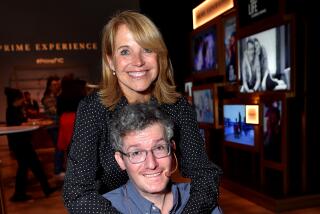COMMENTARY : For Some, âLife Goes Onâ Has Been a Lifeline : Television: Public knowledge about Down syndrome and how to cope with it grew during the ABC seriesâ run, which ends Sunday.
âLife Goes Onâ probably has done more to help people with Down syndrome than anything else in the last 20 years. We will certainly miss it. (The final original episode airs Sunday at 7 p.m. on ABC, Channels 7, 3, 10 and 42.)
When the series premiered in 1989, most of the public were still in the Dark Ages about the disorder, which is caused by an extra 21st chromosome received at conception from the ovum or sperm and which causes varying degrees of mental retardation. âQuincy,â âThe Fall Guyâ and a few other TV programs had dealt with it briefly and even employed actors with the condition, but those of us with children with Down syndrome longed for a series that would raise public awareness of our kidsâ need to be included in all aspects of life.
When we found out that Michael Braverman planned to produce a family drama that included a prominent character with Down syndrome and that he would be played by Chris Burke, a young man with Down syndrome, we were ecstatic. When we finally saw the program, our high hopes were realized.
Here was a quality show reinforcing family values and demonstrating the worth of individuals within the family unit. And rather than building the series around Burkeâs character, Corky, he was portrayed as just another member of the Thacher family whose special situation in life was Down syndrome. The parents dealt with his particular needs just as they dealt with the particular needs of the other children in the family.
The fallout for us since then has come in many ways:
* The most important thing âLife Goes Onâ has done is raise recognition of what Down syndrome is. Few people knew before. Now our parents find much greater acceptance of their children, and more understanding of the parents themselves, who in the past were often put on pedestals by the public instead of being seen as average people dealing as best they could with one of lifeâs many challenges. Even fund-raising for our organization got easier.
* Along with that increased public awareness has come greater acceptance of the fact that people with Down syndrome do not need to be segregated. They can be productive members of society, contributing in whatever way is possible for them. By exposing the public to realistic depictions of people with mental retardation, âLife Goes Onâ reinforced the fact that all people have the same basic needs and that we should not put limitations on anyone.
* There is a more positive attitude toward the future of people with Down syndrome. Parents of children with Down syndrome have found consolation and encouragement through the example of Corky and, later, his girlfriend, Amanda (Andrea Friedman)--not to mention in what Burke himself has accomplished as an actor and a role model. Families whose children have been born since the series began have been able to see a young adult in action, giving them hope that their childâs potential may be greater than they imagined during those first horrible hours after they were given the diagnosis of Down syndrome.
Occasionally situations depicted on the series were unrealistic or over-dramatized, and we had to remind ourselves that âLife Goes onâ was an entertainment program. On the other hand, Corkyâs failures, such as his attempt to drive and the fire he accidentally set at a restaurant, were very realistic, and the difficulties he encountered in school--winning acceptance from his classmates, struggling with a math class--were helpful to our parents and the public in acknowledging that there are problems and showing that they can be resolved.
We will always be grateful to Michael Braverman for the concept of the series and his willingness to cast Chris Burke in such an important role. We are disappointed at the showâs passing, but the work of the Down Syndrome Assn. and similar organizations around the country continues, and life goes on.
Nancy F. Hall is executive director of the Down Syndrome Assn. of Los Angeles and is the mother of a 17-year-old daughter with Down syndrome.
More to Read
The complete guide to home viewing
Get Screen Gab for everything about the TV shows and streaming movies everyoneâs talking about.
You may occasionally receive promotional content from the Los Angeles Times.






